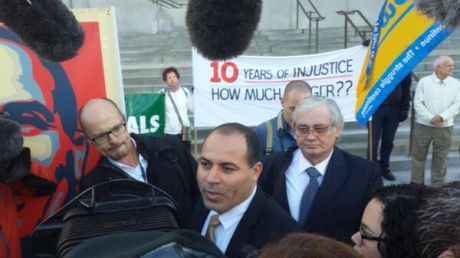Reports
You are here
Standing room only at #harkatSC2013

October 28, 2013
At the Supreme Court building in Ottawa on October 10 2013, crowds of cheering supporters welcomed Mohamed Harkat as he took his Security Certificate case to the country’s highest court for the second time in seven years.
Attending at court were representatives from groups such as Independent Jewish voices, Canadian Union of Postal Workers, and the Ottawa Raging Grannies, to name a few. The crowd was significantly larger than it was the last time he was there, and the hearings were marked by an unusually high number of approved intervenors—ten—a seeming indication of how much importance the Supreme Court judges are placing on the case. The intervenors include Amnesty International, the Canadian Association of Refugee Lawyers (CARL), and the National Council of Canadian Muslims (NCCM, formerly CAIR-CAN).
Secret trials
Under the Immigration and Refugee Protection Act, non-citizens can be detained under so-called Security Certificates without charge, for years, and are denied access to the information upon which their case is based when the information is kept secret by CSIS or CBSA for reasons of national security. Mohamed Harkat and Adil Charkaoui have successfully challenged the process in the past, because its process denies detainees the right to know and meet the case against them—part of fundamental justice, as defined in the Canadian Charter of Rights and Freedoms as well as in international law.
This time around, the constitutional issues relate to two specifics: the destruction of original material upon which the Crown based its case, and the application of a class exemption to human sources used by CSIS. Although the government added “special advocates” to the process in 2008, even these special advocates cannot cross-examine or meaningfully challenge the human sources.
In the days leading up to the hearings, the Justice for Mohamed Harkat committee put a push on gathering more signatures on the Statement/Petition on Security Certificates. As of mid October the number of signatures had reached nearly 6000. The hearings are an appeal from both sides of the case – constitutional issues on the side of Harkat and the intervenors, and an appeal by the Crown of the Federal Court decision to overturn the finding of reasonableness of Harkat’s certificate.
The Crown
The hearings were illuminating. Fifteen minutes in, the problem with the Security Certificates – known as Canada’s secret trials – was absolutely clear. The Crown lawyers used findings of "fact" from the lower court rulings, without mentioning that most of those "facts" are actually gleaned from hearsay and innuendo, since Security Certificates have the lowest standard of proof of any judicial proceeding in Canada. The Crown depicted as suspicious Mohamed Harkat’s all-too-human panicked decisions as a young man, prior to his escape to Canada as a convention refugee. The Crown picture of Harkat as a supposedly evil mastermind is at odds with their picture of his alleged lack of consistency.
The Crown strategy was to argue, first, that national security trumps the requirement of a fair hearing, and second, to deflect discussion of constitutionality in favour of focussing on the specific case. Their strategy did not appear to go over well with the judges. One judge asked the Crown how it could be constitutional that a person doesn't know the evidence against them. Others asked the Crown how a judge can assess prejudice against the detainee without reviewing the destroyed originals. Another judge speculated that perhaps the whole process is unfair and should be junked. In another query, a judge asked if the fact that the special advocates can’t cross-examine witnesses is "minimum impairment" of the ability to defend.
One main inconsistency in the Crown’s argument was that, in their view, a judge can assess prejudice to the detainee, but when it comes to deciding on whether national security would be endangered by examining human sources, not so much; there, it appears, only CSIS can decide.
Harkat’s counsel
Mohamed Harkat's counsel argued that, first, Security Certificates are more than just immigration proceedings. Meeting the case must be meaningful, and the current model is completely lacking in fairness and balance. Harkat lawyer Norm Boxall argued convincingly that a system where a defence must rely on the Crown's information is fundamentally flawed.
Generally, the lawyers arguing against the process used a strategy that can be summed up as follows: just improving something, even substantially, does not necessarily fix it. CSIS destroyed information, Harkat suffered prejudice to his ability to know and meet the case, and the furnishing of remnants did not constitute a remedy. Even special advocates feel they can’t fairly and properly represent the detained.
Intervenors NCCM, International Civil Liberties Monitoring Group (ICLMG) and others made very convincing statements that go straight to the heart of the notion of a democratic justice system: open justice. “Open justice is the very soul of justice,” stated the lawyers for NCCM; judicial secrecy itself reinforces negative stereotypes against Muslims. The lawyer for Amnesty International added that the internationally recognized fairness principles of justice are: open justice, an adversarial process, and “equality of arms” (which requires conditions that do not place a party at a substantial disadvantage). The Security Certificates process fails all three. “As fair as can be is not the same as fair,” he argued.
Barbara Jackman, the lawyer for ICLMG and the Canadian Council of Refugees argued that the Security Certificate cases are not a “mere” question of residence but of human rights, the right to safety and security of the person. “Secrecy is becoming the new norm,” she argued; the Supreme Court must reaffirm open justice and open courts.
On October 11, the Supreme Court held what was an almost unprecedented secret hearing on the Harkat case. The need for open justice has never been clearer.
For more information visit Justice for Mohamed Harkat
Section:
Topics:









